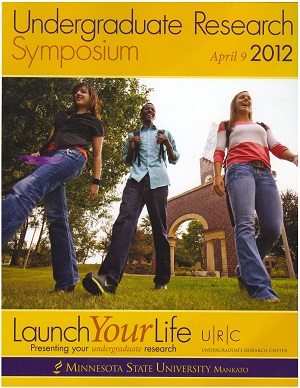Location
CSU 203
Start Date
9-4-2012 3:00 PM
End Date
9-4-2012 4:00 PM
Student's Major
Elementary and Early Childhood Education
Student's College
Education
Mentor's Name
Elizabeth Sandell
Mentor's Department
Elementary and Early Childhood Education
Mentor's College
Education
Description
This study compared changes in the Cultural Orientation of four groups of undergraduate students in a course, Human Relations in a Multicultural Society. The hypothesis for this study was that the intentional, cross-cultural experiences the students experienced in the course did have an impact on the Cultural Orientation of each student. A convenience sample of 85 students registered for 4 sections during fall 2011. The course design provided for intercultural partnerships with individuals from diverse populations outside the classroom and for reflection on such interactions. Each student completed (1) minimum of 18 hours service learning at an agency with persons of a culture different than that of the students, (2) a minimum of 9 hours of cultural partnership with a person of a culture different than that of the students, and (3) several self-reflection papers about temperament and course experiences. The Intercultural Development Inventory (IDI) (Hammer and Bennett, 1998 and 2001) was used as a measure of Cultural Orientation. The IDI was completed by subjects at the beginning and at the conclusion of the semester. The two researchers coded two reflection papers according to the five stages of Cultural Orientation described by the IDI. The two researchers compared their own scores of the papers to determine inter-rater reliability and also compared their scores of the papers with the subjects’ scores on the IDI.
Creative Commons License

This work is licensed under a Creative Commons Attribution-NonCommercial 4.0 International License
Qualitative Analysis of the Impact of a Cultural Partnership on the Cultural Orientation of Undergraduates
CSU 203
This study compared changes in the Cultural Orientation of four groups of undergraduate students in a course, Human Relations in a Multicultural Society. The hypothesis for this study was that the intentional, cross-cultural experiences the students experienced in the course did have an impact on the Cultural Orientation of each student. A convenience sample of 85 students registered for 4 sections during fall 2011. The course design provided for intercultural partnerships with individuals from diverse populations outside the classroom and for reflection on such interactions. Each student completed (1) minimum of 18 hours service learning at an agency with persons of a culture different than that of the students, (2) a minimum of 9 hours of cultural partnership with a person of a culture different than that of the students, and (3) several self-reflection papers about temperament and course experiences. The Intercultural Development Inventory (IDI) (Hammer and Bennett, 1998 and 2001) was used as a measure of Cultural Orientation. The IDI was completed by subjects at the beginning and at the conclusion of the semester. The two researchers coded two reflection papers according to the five stages of Cultural Orientation described by the IDI. The two researchers compared their own scores of the papers to determine inter-rater reliability and also compared their scores of the papers with the subjects’ scores on the IDI.
Recommended Citation
Liedall, Sadie and Sarah Lieske. "Qualitative Analysis of the Impact of a Cultural Partnership on the Cultural Orientation of Undergraduates." Undergraduate Research Symposium, Mankato, MN, April 9, 2012.
https://cornerstone.lib.mnsu.edu/urs/2012/oral-session-12/1




